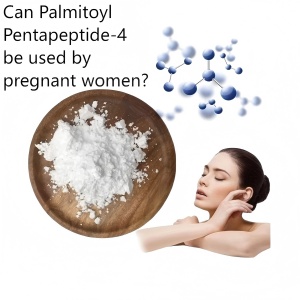Can Palmitoyl Pentapeptide-4 be used by pregnant women?

Palmitoyl Pentapeptide-4 is a common ingredient in many anti-aging and skin-repairing products, often praised for its ability to reduce the appearance of fine lines and improve skin elasticity. But when it comes to pregnancy, skincare choices can become a bit more complicated. Pregnant women are usually more cautious about what they put on their skin, and for good reason. While Palmitoyl Pentapeptide-4 is considered safe for general use, its safety profile during pregnancy isn’t fully confirmed by large-scale studies. Understanding the science behind this ingredient and how it behaves on the skin can help expecting mothers make informed choices.
What Is Palmitoyl Pentapeptide-4?
Palmitoyl Pentapeptide-4, also known as Matrixyl, is a synthetic peptide composed of five amino acids linked with a fatty acid chain. It is widely used in skincare products aimed at promoting collagen production and improving skin firmness. It works by signaling the skin to repair itself, similar to how the body responds after a wound. It’s known for being effective but gentle, which is why it appears in many serums and moisturizers.
How It Works in Skincare
This peptide is a fragment of collagen, and when applied topically, it can trigger the skin’s natural repair process. It helps reduce wrinkles and enhances skin smoothness. Palmitoyl Pentapeptide-4 does not penetrate deeply into the bloodstream. Most of its action is localized on the skin’s outer layers, making it less likely to affect internal systems. This limited absorption is often why it’s labeled as low-risk compared to retinoids or salicylic acid, which are more easily absorbed and come with pregnancy warnings.
What Experts Say About Use During Pregnancy
While there isn’t any direct evidence showing that Palmitoyl Pentapeptide-4 is harmful during pregnancy, it hasn’t been widely tested in pregnant populations. Dermatologists generally consider it safe, especially compared to other anti-aging ingredients that are contraindicated during pregnancy. That said, doctors often recommend sticking to products that have a long-standing record of safety for pregnant women, especially in the first trimester. If a woman chooses to use a product with Palmitoyl Pentapeptide-4, it’s wise to consult with a healthcare provider for peace of mind.
Choosing the Right Products
If you are pregnant and still want to use skincare products containing Palmitoyl Pentapeptide-4, look for formulations that are fragrance-free and free of other potentially irritating ingredients. Use these products as part of a simple, gentle skincare routine. Always patch test a new product on a small area of skin first to check for any sensitivity, which can be more common during pregnancy due to hormonal changes.
Alternative Ingredients for Pregnancy-Safe Skincare
For those who prefer to avoid Palmitoyl Pentapeptide-4 during pregnancy, alternatives like hyaluronic acid, niacinamide, and vitamin C are widely considered safe. These ingredients offer hydration, brightness, and barrier support without the potential concerns associated with more active peptides. They’re a good choice for maintaining skin health while playing it safe during this sensitive time.
